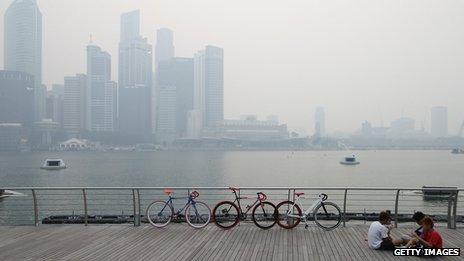Air pollution causes cancer - WHO
- Published

Smog in Singapore caused by fires in nearby Sumatra
Pollutants in the air we breathe have been classed as a leading environmental cause of cancer by the World Health Organization.
It said the evidence was clear, external they cause lung cancer.
Sources of pollution include car exhausts, power stations, emissions from agriculture and industry - as well as heating in people's homes.
The WHO said the classification should act as a strong message to governments to take action.
The International Agency for Research on Cancer (IARC), a part of the WHO, has now classed air pollution in the same category as tobacco smoke, UV radiation and plutonium.
It said air pollution had been know to cause heart and lung diseases, but evidence had now emerged that it was also causing cancer.
The IARC said the most recent data suggested 223,000 deaths from lung cancer around the world were caused by air pollution.
More than half of the deaths were thought to be in China and other East Asian countries. Rapid industrialisation has led to smoggy skies in cities such as Beijing.
However, it is a global problem and concerns about air pollution were raised in Europe again this week, external.
Data suggests there may also be a link with bladder cancer.
Dr Kurt Straif, from IARC, said: "The air we breathe has become polluted with a mixture of cancer-causing substances.
"We now know that outdoor air pollution is not only a major risk to health in general, but also a leading environmental cause of cancer deaths."
Cancer Research UK said it was not a surprise.
Dr Julie Sharp, the head of health information at the charity, said: "It's important that people keep the risk from air pollution in perspective.
"Although air pollution increases the risk of developing lung cancer by a small amount, other things have a much bigger effect on our risk, particularly smoking."
Dr Rachel Thompson, head of research interpretation at the World Cancer Research Fund International, said: "This latest evidence confirms the need for government, industry and multinational bodies to urgently address environmental causes of cancer.
"But there's also a lot we can do as individuals to lower our chances of developing the disease such as being more physically active and adopting a healthier diet."
- Published15 October 2013
- Published10 July 2013
- Published12 September 2013
- Published15 July 2013
- Published14 November 2011